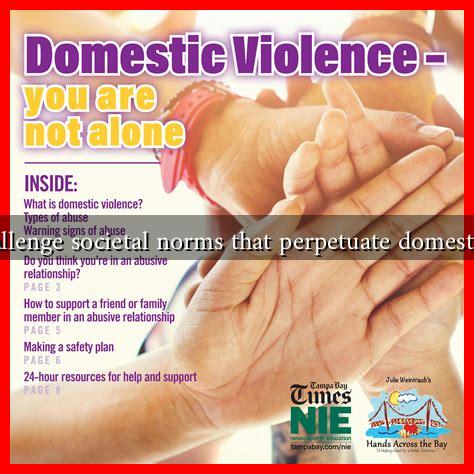-
Table of Contents
How to Challenge Societal Norms that Perpetuate Domestic Violence
Domestic violence is a pervasive issue that affects millions of individuals worldwide, transcending boundaries of age, gender, and socioeconomic status. Despite increased awareness and advocacy, societal norms often perpetuate this cycle of violence. Challenging these norms is crucial for creating a safer environment for all. This article explores effective strategies to confront and dismantle the societal constructs that enable domestic violence.
Understanding Societal Norms and Domestic Violence
Societal norms are the unwritten rules that govern behavior within a community. They shape perceptions of gender roles, power dynamics, and acceptable behavior in relationships. In many cultures, traditional norms may endorse male dominance and female submissiveness, creating an environment where domestic violence can thrive. According to the World Health Organization (WHO), approximately 1 in 3 women globally have experienced physical or sexual violence, primarily from an intimate partner. This statistic underscores the urgent need to challenge the norms that allow such violence to persist.
Strategies to Challenge Societal Norms
To effectively combat domestic violence, it is essential to adopt a multi-faceted approach that involves education, advocacy, and community engagement. Here are several strategies that can be employed:
- Education and Awareness: Raising awareness about the realities of domestic violence is crucial. Educational programs in schools and communities can help dismantle harmful stereotypes and promote healthy relationships. For instance, initiatives like Love Is Respect provide resources for young people to understand the importance of consent and respect in relationships.
- Engaging Men and Boys: Involving men and boys in the conversation about domestic violence is vital. Programs that encourage them to challenge toxic masculinity and promote gender equality can lead to significant cultural shifts. The Men’s Health Network offers resources aimed at engaging men in discussions about healthy relationships.
- Community Mobilization: Grassroots movements can be powerful in challenging societal norms. Community organizations can host workshops, rallies, and discussions that focus on the impact of domestic violence and the importance of community support. For example, the National Coalition Against Domestic Violence provides resources for community mobilization.
- Policy Advocacy: Advocating for policy changes at local, state, and national levels can help create a legal framework that protects victims and holds perpetrators accountable. This includes supporting legislation that addresses domestic violence, such as stricter penalties for offenders and funding for victim support services.
- Utilizing Media and Technology: Social media campaigns can raise awareness and challenge societal norms. Hashtags like #MeToo and #TimesUp have shown the power of collective voices in addressing issues of violence and harassment. Creating content that educates and empowers individuals can help shift public perception.
Case Studies and Examples
Several successful initiatives have demonstrated the effectiveness of these strategies:
- White Ribbon Campaign: This global movement encourages men to take a stand against violence towards women. By wearing a white ribbon, men pledge to never commit, condone, or remain silent about violence against women.
- UN Women’s HeForShe Campaign: This initiative invites men to advocate for gender equality and challenge the norms that perpetuate violence against women. It has garnered support from high-profile figures and has successfully engaged millions worldwide.
Conclusion
Challenging societal norms that perpetuate domestic violence requires a concerted effort from individuals, communities, and policymakers. By focusing on education, engaging men and boys, mobilizing communities, advocating for policy changes, and utilizing media, we can create a culture that does not tolerate violence. The fight against domestic violence is not just a women’s issue; it is a societal issue that requires the involvement of everyone. Together, we can dismantle the harmful norms that allow domestic violence to persist and foster a safer, more equitable world for all.

